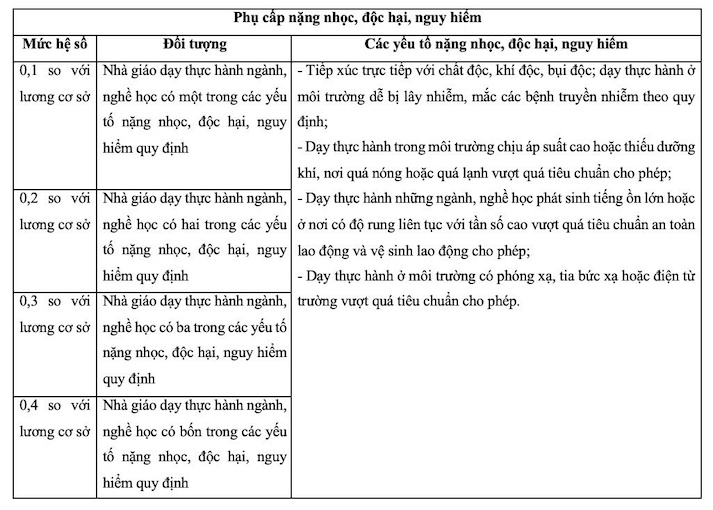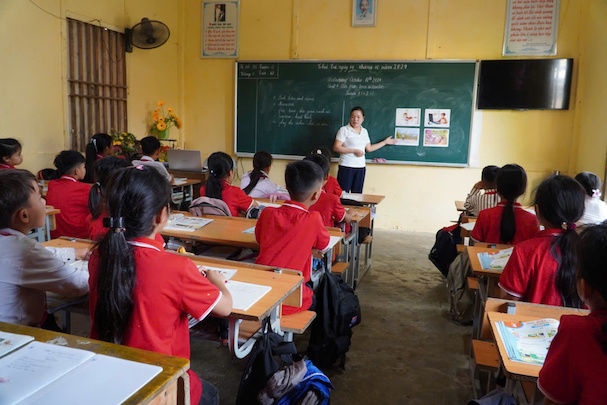In addition to salary, teachers are expected to receive 3 allowances from January 1, 2026
The Ministry of Education and Training (MOET) is soliciting comments on the Draft Decree on salary policy and allowance regime for teachers, expected to be applied from January 1, 2026. According to the draft, in addition to salary, teachers will receive 3 new types of allowances including: work responsibility allowance, mobile allowance and heavy, toxic, and dangerous allowance, to ensure their rights and encourage teachers to work with peace of mind, especially in disadvantaged areas.
The job responsibility allowance applies to teachers who concurrently hold professional group leadership positions, teach students with disabilities to integrate or take on special jobs. The benefit level is calculated at 0.2 times the basic salary, based on the number of teaching hours in the month. This allowance is paid at the same monthly salary but is not used to calculate social insurance. Principals, vice Principals and those who have received responsibility allowances under Decree 76/2019/ND-CP will not receive additional allowances under the new regulations. See more...

The Ministry of Education and Training proposes that all teachers are entitled to a special salary coefficient
According to the draft Decree on salary and allowance policies for teachers that the Ministry of Education and Training (MOET) has just announced for comments, from 2026, all teachers nationwide will receive a special salary coefficient. In which, preschool teachers are entitled to a coefficient of 1.25 times, other titles of teachers are 1.15 times compared to the current salary coefficient; teachers teaching in border areas, integrated schools or boarding schools are added 0.05 times. The new salary will be calculated according to the formula: Basic salary x Current salary coefficient x Special coefficient.
In addition to salary, teachers from 2026 can receive 3 main allowances including responsibility allowance, mobile allowance and allowance according to working conditions.
The draft also adds subjects entitled to allowances, such as group leaders, teachers teaching ethnic languages, teaching foreign languages (not foreign languages), teachers assigned to advise students, or teaching inter-schools, moving between schools. The Ministry of Education and Training affirms that this regulation is to ensure fairness and encourage teachers to teach with peace of mind, especially in disadvantaged areas. See more...
Making English the second language in schools, it is necessary to solve the problem of teacher shortage
The Prime Minister has just approved the Project "Bringing English as a Second Language to Schools in the 2025-2035 period", which stipulates that English will become a mandatory subject from grade 1. The project aims to have at least 20% of schools achieve level 1 in English teaching in the first year of implementation and gradually increase the rate of schools achieving level 2 and 3 in the following years. This policy aims to improve students' foreign language proficiency, but poses a big challenge for the teaching staff.

Many schools, especially in disadvantaged areas, are lacking English teachers. Ms. Lieu Thi Kham - Principal of Trang Phai Primary and Secondary School (Lang Son) - said that the school had to hire teachers for a short time due to insufficient staffing, leading to instability in teaching. In addition, schools are facing difficulties in training and fostering new teachers, and differences in English proficiency between levels of education, making implementation from grade 1 complicated. According to the Ministry of Education and Training, by 2030, it is necessary to add about 22,000 new English teachers and train 200,000 teachers to meet the project requirements.
According to Dr. Nguyen Tung Lam, Vice President of the Vietnam Association of Educational Psychology, the feasible solution is to combine the training of existing teachers and the recruitment of new teachers. On-site teachers can be trained to achieve standard teaching qualifications after 1-2 years, while new recruitment helps increase human resources quickly. See more...
Enterprises hunt for young human resources at the 2025 Financial Academy Recruitment Festival











